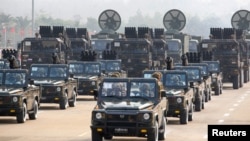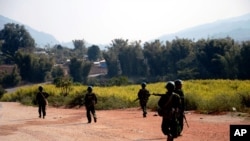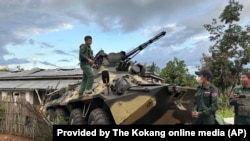A prominent human rights expert is calling on governments to end the billion-dollar arms trade with Myanmar’s military, which is “helping sustain the junta’s brutal campaign of violence against civilians across Myanmar.”
In a report to the U.N. human rights council Thursday, Thomas Andrews, special rapporteur on the human rights situation in Myanmar, accused international finance systems of helping Myanmar procure the weapons that have “enabled attacks on civilians” and have killed, maimed and displaced thousands of people.
Since the military junta toppled the country’s democratically elected government in February 2021, the U.N. human rights office reports at least 5,280 civilians, including 1,022 women and 667 children, “have been killed at the hands of the military.”
Additionally, the agency reports at least 3 million people have been displaced — “the vast majority still without proper shelter,” and more than 20,000 political prisoners remain in detention.
Andrews told the council that in the two years ending March 2024, the Myanmar military has purchased $630 million in weapons, dual-use technologies, manufacturing equipment, and raw materials through the international finance system.
The special rapporteur identified 16 foreign banks that have facilitated transactions related to military procurement by the junta, noting that the junta and its cronies have worked to obscure the specific nature of the transactions “including by setting up military front companies.”
He referenced a report he issued last year, “The Billion Dollar Death Trade,” in which he identified Singapore as the junta’s third largest source of weapons and related materials.
Because of that report, he told the council that “to its credit, the government took immediate action and launched an investigation of my findings. I am very pleased to report that the junta’s purchase of military supplies from Singapore dropped by nearly 90 percent since the publication of that report.”
“Unfortunately, military procurement through Thailand has moved in the opposite direction,” he said, underscoring the junta imported nearly $130 million in weapons and military from Thailand-registered suppliers, “more than double the total from the previous year.”
He observed, however, “It is important to note that as was the case with Singapore last year, I found no evidence that the government of Thailand was involved or even aware of these transactions,” adding that he was hopeful Thailand based entities, including its banks “will no longer be facilitating the transfer of weapons and weapons materials to the military junta.”
Andrews called on financial institutions to stop facilitating transactions with banks that are controlled by the military junta and for governments to sanction those junta-controlled banks, including Myanmar Economic Bank.
The special rapporteur garnered support from member states, including the United States, for his appeal.
“We applaud Singapore for taking action to cut arms supplies to the military and call on others to follow suit,” Michele Taylor, U.S. ambassador to the U.N. Human Rights Council, said during the council’s interactive dialogue.
“We urge the Security Council to use all the tools at its disposal to prevent future atrocities, including by reinforcing this body’s call to cut off the military’s access to jet fuel, and to support efforts to find a peaceful and just resolution to the crisis,” she said.
Andrews said the people of Myanmar need and deserve the support of the council and governments. He emphasized they also need international action, “not only because of the military junta’s relentless attacks on the people of Myanmar, but because there are opportunities available to your governments right now that would make an enormous difference in how and when this crisis comes to an end.”
“The tide is turning in Myanmar, the junta is on its heels, and the opportunity to take decisive action is now,” he said, pointing out that civilian resistance forces are gaining ground.
He said the government’s military bases are falling, tens of thousands of troops “have been lost to casualties, surrender, or defections,” and the economy is being squeezed.
“In response, the junta is doubling down on its brutal attacks on civilian populations,” he said. “Junta leaders appear committed to destroying the country that they cannot control.”
He said the world must not allow that to happen.
“We now have clear evidence that actions taken by the international community to isolate the junta and degrade its capacity to attack the people of Myanmar are working.
“But more must be done and done now to build on this progress including strategic coordination between all governments who support human rights to stop the flow of sophisticated weapons of war that are being used to attack innocent Myanmar civilians,” he said.






